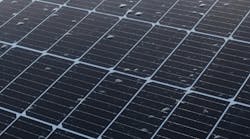Polymer-Enhanced Highway BMPs
Contractors and department of transportation agencies often are challenged to achieve maximum results within tight budget constraints. Polymer-enhanced best management practices (BMPs) can be applied quickly and control highly erosive forces caused by wind and water. These techniques have been proven time and again when used on highway construction and repair projects.
In 2005, Hurricane Dennis destroyed 14 miles of Highway 98 along Florida’s panhandle. The Florida Department of Transportation (FDOT) moved quickly to reconstruct the road. One month later, erosion threatened to encroach upon the travel lanes. Cost-effective, short-term solutions were sought while a more permanent plan could be developed. One supposedly “cost-effective” option would have cost $750,000 for materials alone.
FDOT then consulted local storm water and erosion control personnel, who suggested using a nontoxic polymer-enhanced soft-armor BMP technique. The application needed to bind beach sand, jute matting, compost and sod in such a way that fine sediment could not be washed or dissolved from the installation during severe storms.
The design of the application would consist of removing the existing turf, regrading the shoulders and front slope, installing a polymer-enhanced soft armoring system with salt-tolerant sod, and installing protection with temporary silt fence at the base of the front slopes. With labor and materials, this process could be implemented
for $744,650.
FDOT chose this option, and work began by regrading the shoulder and covering it with 2 in. of nutrient-rich compost material to help establish and maintain the soil-stabilizing vegetation. The shoulder was covered with open-weave jute matting and sprinkled with site-specific APS 705 Silt Stop Powder at 50 lb per acre for soil stabilization.
The powder reacts with the metals and clays in the soil to bind it. When used in conjunction with matting or straw, the powder creates an erosion-resistant matrix bond that supports the establishment of vegetation and aids in the attachment of fine particulate to the matting. This solution is effective in areas where permanent vegetation is required and water velocity may be high. Application rates are determined by soil type and grade of slope.
Finally, Bermuda grass sod was laid over the polymer-enhanced jute matting and a highly erosion-resistant matrix bond was created. After one year—and two major storm events, a Category 1 hurricane and a tropical depression—the polymer-enhanced soft armoring still performed. It required little maintenance and successfully mitigated coastal erosion. The solution was permanent, with no repairs necessary. The jute matting biodegraded, and the well established sod stayed intact over time.
Polymer-enhanced hydroseeding also was used in 2004 during road construction of the I-22 at Cherry Avenue in Birmingham, Ala. The Alabama Department of Transportation (ALDOT) and W. S. Newell Inc. were in charge of the project and needed to stabilize the side slopes and mediums. The typical solution, covering all 49 acres with a 3- to 4-in.-deep layer of No. 410 modified stone, would have cost hundreds of thousands of dollars.
Skip Ragsdale, owner of Sunshine Supplies Inc., recommended hydroseeding all 49 acres of the roadbed with a mixture of APS 740 Silt Stop Powder and water to stabilize the exposed soil and to prevent erosion until paving could begin six months later. When paving began, the roadbed showed no significant signs of erosion, meaning no additional labor or repair expenses were incurred. In total, ALDOT and W. S. Newell saved approximately $450,000.

